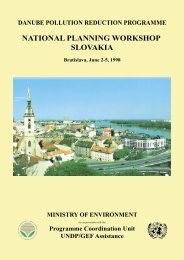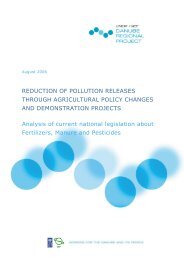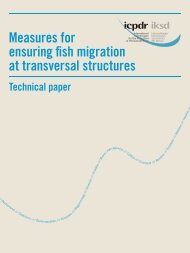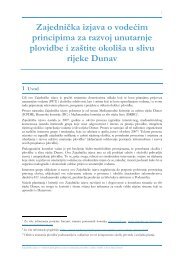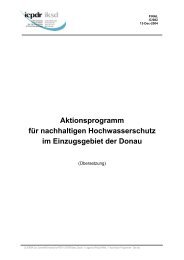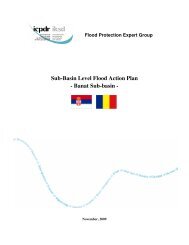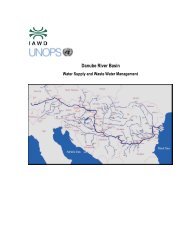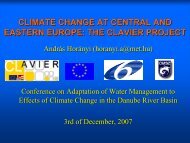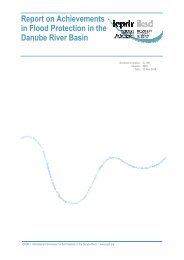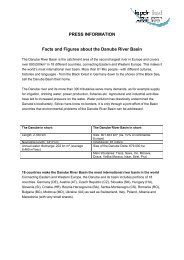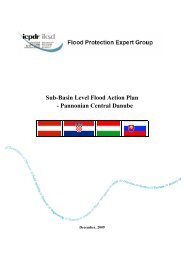Technical Reports Parts C,D - ICPDR
Technical Reports Parts C,D - ICPDR
Technical Reports Parts C,D - ICPDR
You also want an ePaper? Increase the reach of your titles
YUMPU automatically turns print PDFs into web optimized ePapers that Google loves.
<strong>Technical</strong> <strong>Reports</strong> – Part D: Water Environmental Engineering 131<br />
<br />
<br />
The Agreements between Ukraine and Moldova on the common use and protection of<br />
water resources of Dnister River,<br />
The Agreements between Ukraine and Poland on the boundary control of the water<br />
quality of Western Bug and other rivers.<br />
There are many agreements concerning the cross-border control of the water quality between<br />
Ukrainian regional nature protection departments and similar departments in Hungary, Poland,<br />
Slovakia, Belarus.<br />
Black Sea matters<br />
Along with the independence, Ukraine gained the status of a marine State. But the Black Sea which<br />
Ukraine has access to, is an internal sea and, unfortunately is on the list of the most polluted seas in<br />
the world. The situation with the Black Sea has not always been like this. The Black Sea is a<br />
unique marine natural system with its bioproductive, recreational and potential capacities. Huge<br />
productive potential of the Black Sea and its basin has been providing the Black Sea area<br />
inhabitants with all the necessary-for-life products for thousands of years. In the beginning of the<br />
20th century one could still get an impression of the guaranteed endless use of its resources. But the<br />
exceeding use of the marine resources and the use of the Black Sea as the reservoir for wastes<br />
disposal, especially during the period of the last thirty years, have caused catastrophic degradation<br />
of its environmental system and drastic reduction of its productivity.<br />
Ukraine has the longest coastal line in this rather inhabited region. That is why its environment has<br />
always been a subject to close attention and major concern for the Ukrainian Government.<br />
But Ukraine is not the only country to use the resources of the Black Sea, and the infinite<br />
contamination of marine environment comes from the collector basin, the surface of which several<br />
times exceeds the surface of the Black Sea itself. The Black Sea gathers a convincing number of 17<br />
countries around it. Thus, the solution of the Black Sea environmental problems is impossible<br />
without thoroughly considered international co-operation. The commitments undertaken by the<br />
Black Sea countries concerning the protection and use of its resources is set out in the Convention<br />
on the Black Sea pollution protection (done in Bucharest in 1992) that is the basic legal title<br />
defining the priorities and directions of the international nature protection activities in the Black<br />
Sea basin. The Convention was ratified by all the Black Sea countries. The general nature<br />
protection policy is outlined in the Odessa Declaration signed by the Ministers of environment<br />
protection of Bulgaria, Georgia, Russia, Romania, Turkey and Ukraine in 1993. Practically the<br />
Declaration gave the start to the idea-generating process that was later put into words in the<br />
Convention of Bucharest.<br />
It was under this legislation base that the International Programme ’Management and protection of<br />
the Black Sea’ for the years of 1993 - 1997 to assist the Governments of Bulgaria, Georgia, Russia,<br />
Romania, Turkey and Ukraine to carry out the provisions of the Convention, was implemented<br />
under the umbrella of GEF. The Programme consisted of 3 components and was oriented on:<br />
<br />
<br />
<br />
strengthening of nature protection potential;<br />
policy development;<br />
attraction of large-scale investments.<br />
The Programme had exclusively positive influence on consolidation of the international efforts in<br />
the field of control for marine environment pollution and use of its natural resources.<br />
The intentions of the Black Sea countries to save the Black Sea from further degradation were<br />
stated in the Programme document that is in the Strategic Action Plan for the Black Sea (signed on<br />
31 of October 1996 by Ministers of Environment of the Black Sea countries). As a development of



